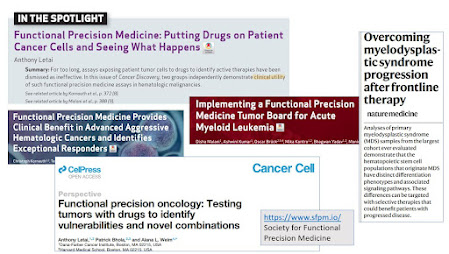The idea of using cancer cells in culture to predict chemoresponse has been around for decades, literally back to the 1970s. However, it's never thrived, and both Medicare and commercial insurers tend to have non coverage policies (see CMS NCD here, see ASCO here). For Medicare nerds, there's even some colorful legal history online.
But this may change soon. There's a groundswell of activity in functional cancer cell assays - of the patient's own cancer cells - to predict chemoresponse. Publications are appearing rapidly and funding of new companies is active.
Here are some entry points:
- For a thorough 2022 review and entry point, see Letai et al., "Functional precision oncology: Testing tumors with drugs to identify vulnerabilities and novel combinations."
- At Cancer Cell here, and open access.
- See two articles in the February 2022 issue of the AACR journal, Cancer Discovery:
- Kornauth, "Functional precision medicine provides clinical benefit in advanced aggressive hematologic cancers and identifies exceptional responders." Here.
- Malani, "Implementing a functional precision medicine tumor board for AML." Here.
- See an Op Ed by Letai on the two articles here.
- See a March 2022 article in Nature Medicine by Ganan-Gomez et al:
Context: Conventional Genomic Medicine is Important, But Results Don't Always Help
Both the Cancer Cell review by Letai, and the Kornauth article (with detailed tables) discuss that broad studies of the population impact of conventional genomic panels often show fairly small results in the whole population, although big results for certain patients (e.g. for the 2% who are ALK fusion positive).
This same point was made by Adashek et al. last year in Nature Cancer, "Missing the target in cancer therapy," 2:369, 2021. These comprehensive tests are critically important to run, to find the positives, yet, 10% of patients may have Gene A, 5% have Gene B, 2% have Gene C, and it tails off from there.
In the same vein, see a December 2021 article in Precision Oncology News, with San Antonio breast conference data, that in a clinical report, the lower-ranked genes or unranked genes (in a 300- or 400-gene panel) do not often contribute to improved survival.
Potentially, functional assays can step in and fill the gap in finding the best therapy choices for the 50-70% of patients who don't have a clear cut gene-targeted drug, or in whom, their ideal gene-targeted drug just didn't work.
____
Tidbit. For those who missed it, see Turna Ray's 2021 year-in-review for precision oncology - January 2022, here.
